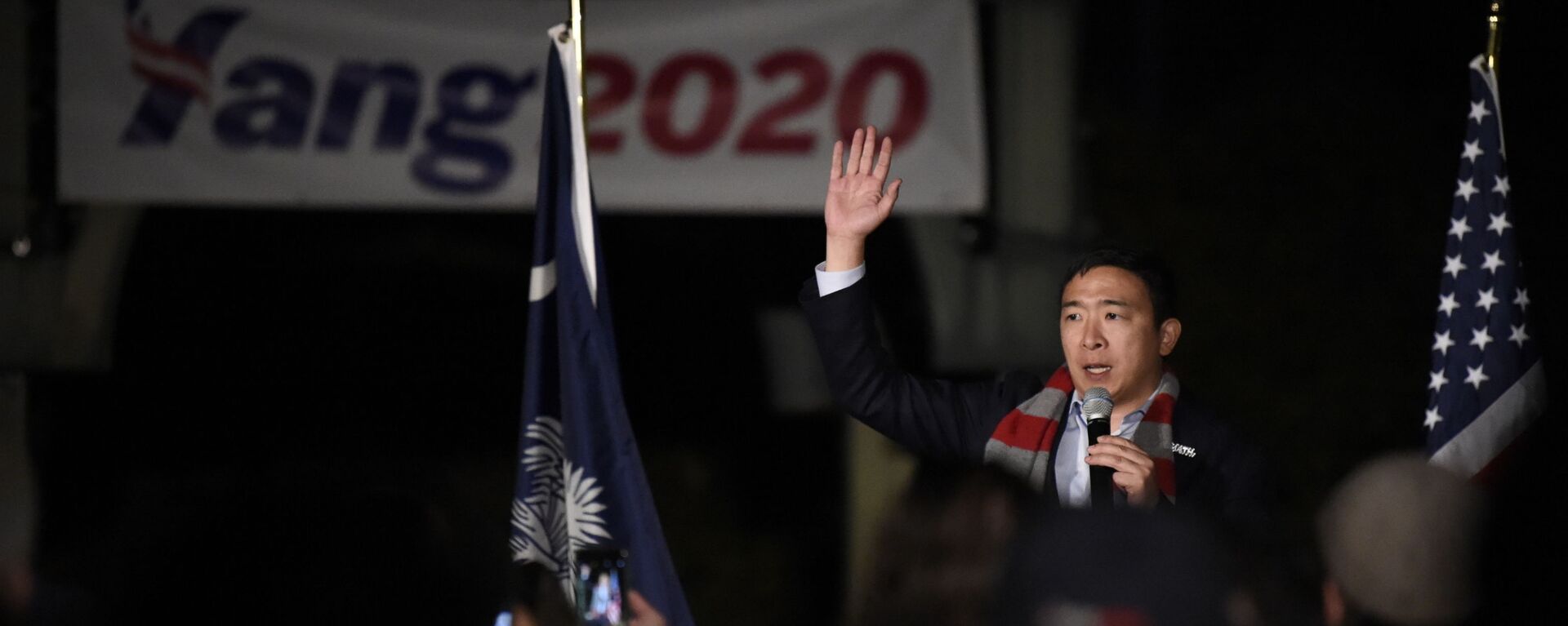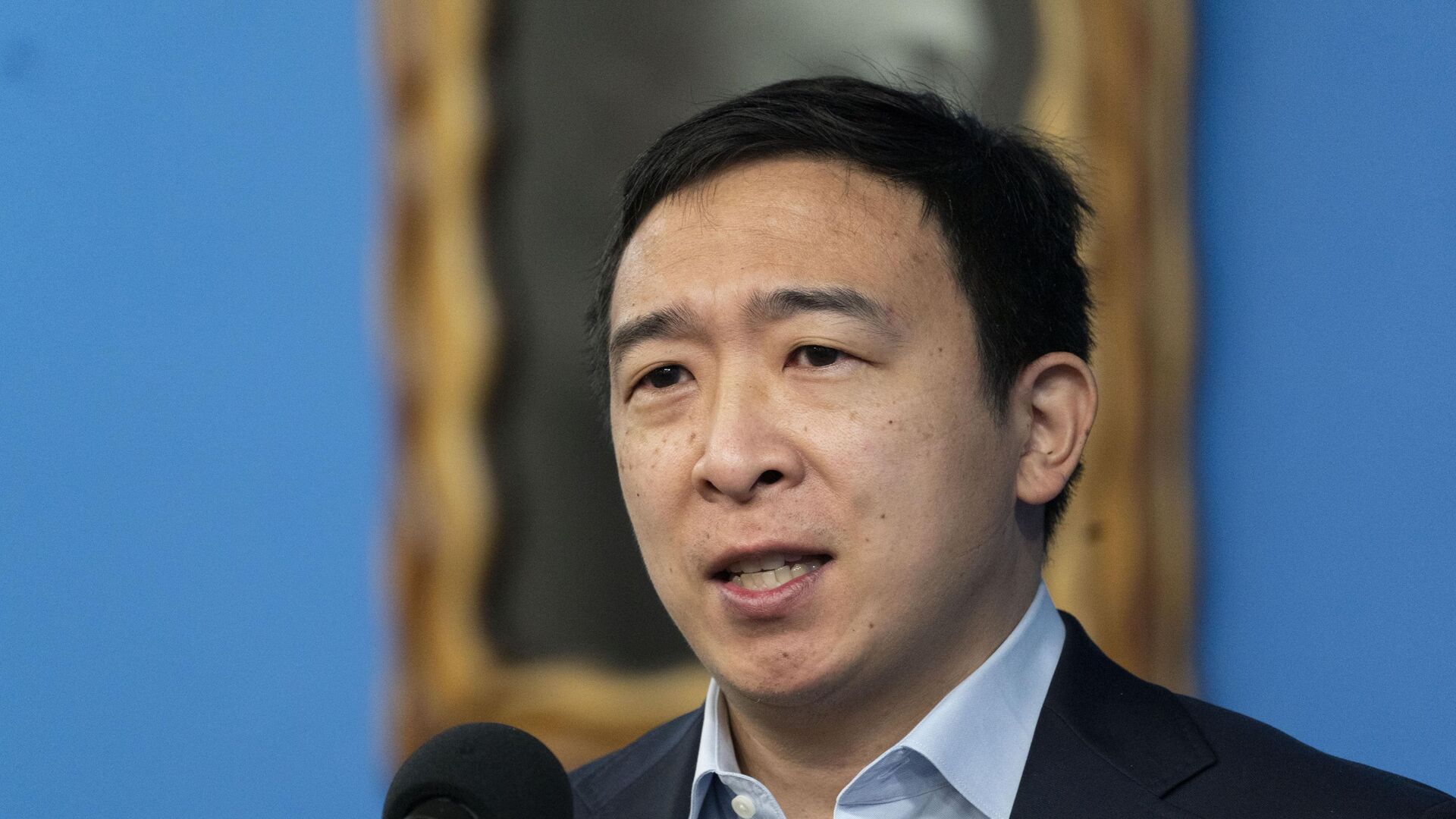https://sputnikglobe.com/20220730/andrew-yangs-new-centrist-party-lacks-mass-appeal-compelling-leadership-experts-believe-1097953191.html
Andrew Yang's New 'Centrist' Party Lacks Mass Appeal, Compelling Leadership, Experts Believe
Andrew Yang's New 'Centrist' Party Lacks Mass Appeal, Compelling Leadership, Experts Believe
Sputnik International
MOSCOW (Sputnik), Kirill Krasilnikov - Andrew Yang's new self-styled centrist party Forward is unlikely to succeed as it lacks genuine popular appeal and... 30.07.2022, Sputnik International
2022-07-30T08:17+0000
2022-07-30T08:17+0000
2022-10-19T18:55+0000
us
party
andrew yang
politics
https://cdn1.img.sputnikglobe.com/img/07e5/05/1b/1083012041_0:9:3072:1737_1920x0_80_0_0_722132fd7c27f8726fb16eac4bbe0ec6.jpg
Earlier in the week, Yang, a former Democratic presidential candidate, announced a new national party comprised of former Democrats and Republicans that presents itself as neither left nor right and allegedly appealing to large swathes of independent voters lacking a viable alternative to the country's two major parties.In a Washington Post op-ed published on Wednesday, Yang together with a former Republican congressman from Florida, David Jolly, and a former Republican governor of New Jersey, Christine Todd Whitman, criticized the Democrats and Republicans as "outdated" and "catering to the fringes." The article goes on to cite a last-year Gallup poll showing that about half of US citizens think of themselves as independents, thus necessitating a new political party that would appeal to the moderate majority.Illusionary CenterWhile Yang and his associates are quick to point to the allegedly unrepresented center, the truth is a bit messier as the so-called independent vote may not be a cookie-cutter thing that can be easily represented by a single party.According to a 2021 analysis by Pew Research Center, ideological groups that have the largest shares of self-described independents do not share the same politics, making it hard to mold them into a unified voting block.This sentiment is echoed by Paul Gottfried, the editor-in-chief of paleoconservative magazine Chronicles and former Horace Raffensperger Professor of Humanities at Elizabethtown College, who does not think there is such thing as "a real center in American politics" as "the 'Independents' lean in one ideological direction or the other, while pretending to represent the center."Keith Preston, an anarchist theoretician and writer, noted that while political partisans are motivated by cultural issues while the rest are lacking coherent politics and often vote based on how they perceive the economy or "superficial assessments of individual candidates in ways that are often misinformed or irrational."He also noted that most of Yang's allies seem to be by and large members of the Republican Party who are bitter over the rise of former US President Donald Trump as well as the presence of the populist right in the Republican base.Gottfried, for his part, rendered an even harsher judgment saying Yang is proposing a party that is "on the far left on social issues but protects wealthy woke capitalists like Mr. Yang."GatekeepingYang is far from the first politician who tried to break the current monopoly of Democrats and Republicans in US politics, with notable examples including the late 19th-century Populist Party that nominated Democrat William Jennings Bryan in the 1896 presidential election against Republican William McKinley as well as Theodore Roosevelt creating his Progressive Party and running for president in 1912 as a third-party candidate. The most recent example is billionaire Ross Perot's failed campaigns for president in 1992 and 1996, the second time as the nominee of his own Reform Party.To this day, the attempts to create a viable alternative to the two major parties have not panned out as the Democrats and Republicans are not eager to abandon the current arrangement and, according to the experts, actively working to preserve it."The two major parties actively collude to prevent third parties from competing. It is possible that the Forward Party could elect candidates in local elections in a few places, but not in a way that will provide them with real power or an ability to compete effectively with the Democrats and Republicans," Preston explained.Singh also thinks that the main parties have the interest to make things difficult for third parties, adding that they also have to contend with the fact that most voters think that picking a third party on the ballot is to waste one's vote."It would be profoundly difficult to disrupt the existing duopoly. And, to be candid, any chance of doing so would require a genuinely charismatic, compelling candidate and leadership - Yang is pleasant but doesn't fit the bill. So, I don't see this as much other than a vanity project, destined to fail," the expert concluded.
https://sputnikglobe.com/20210910/opposing-the-rule-of-two-andrew-yang-leaves-democrats-to-launch-third-party-1088948825.html
Sputnik International
feedback@sputniknews.com
+74956456601
MIA „Rossiya Segodnya“
2022
Sputnik International
feedback@sputniknews.com
+74956456601
MIA „Rossiya Segodnya“
News
en_EN
Sputnik International
feedback@sputniknews.com
+74956456601
MIA „Rossiya Segodnya“
Sputnik International
feedback@sputniknews.com
+74956456601
MIA „Rossiya Segodnya“
us, party, andrew yang, politics
us, party, andrew yang, politics
Andrew Yang's New 'Centrist' Party Lacks Mass Appeal, Compelling Leadership, Experts Believe
08:17 GMT 30.07.2022 (Updated: 18:55 GMT 19.10.2022) MOSCOW (Sputnik), Kirill Krasilnikov - Andrew Yang's new self-styled centrist party Forward is unlikely to succeed as it lacks genuine popular appeal and compelling leadership as well as it will face opposition from the Democrats and Republicans, experts said.
Earlier in the week, Yang, a former Democratic presidential candidate, announced a new national party comprised of former Democrats and Republicans that presents itself as neither left nor right and allegedly appealing to large swathes of independent voters lacking a viable alternative to the country's two major parties.
In a Washington Post op-ed published on Wednesday, Yang together with a former Republican congressman from Florida, David Jolly, and a former Republican governor of New Jersey, Christine Todd Whitman, criticized the Democrats and Republicans as "outdated" and "catering to the fringes." The article goes on to cite a last-year Gallup poll showing that about half of US citizens think of themselves as independents, thus necessitating a new political party that would appeal to the moderate majority.
While Yang and his associates are quick to point to the allegedly unrepresented center, the truth is a bit messier as the so-called independent vote may not be a cookie-cutter thing that can be easily represented by a single party.
According to a 2021 analysis by Pew Research Center, ideological groups that have the largest shares of self-described independents do not share the same politics, making it hard to mold them into a unified voting block.
"Most so-called Independents in fact 'lean' towards one or other of the two main parties. The genuine Independents are very small and typically well-off, suburban, and unusually interested in politics - not a broad enough base for a new party to last," Robert Singh, a professor of politics at Birkbeck, University of London, said.
This sentiment is echoed by Paul Gottfried, the editor-in-chief of paleoconservative magazine Chronicles and former Horace Raffensperger Professor of Humanities at Elizabethtown College, who does not think there is such thing as "a real center in American politics" as "the 'Independents' lean in one ideological direction or the other, while pretending to represent the center."
Keith Preston, an anarchist theoretician and writer, noted that while political partisans are motivated by cultural issues while the rest are lacking coherent politics and often vote based on how they perceive the economy or "superficial assessments of individual candidates in ways that are often misinformed or irrational."
He also noted that most of Yang's allies seem to be by and large members of the Republican Party who are bitter over the rise of former US President Donald Trump as well as the presence of the populist right in the Republican base.
"From what I have seen of Mr. Yang's collaborators so far, they appear to be mostly Never Trumpers, 'RINOs' [Republicans In Name Only] and neocons who resent the ascension of Trump to the leadership of their own party, and equally resent the presence of the populist-right among the Republican base. I do not feel this is a perspective that has mass appeal in the US in a way that would motivate tens of millions of voters to turn toward the Foward Party and away from one of the major parties," Preston stated.
Gottfried, for his part, rendered an even harsher judgment saying Yang is proposing a party that is "on the far left on social issues but protects wealthy woke capitalists like Mr. Yang."

10 September 2021, 11:40 GMT
Yang is far from the first politician who tried to break the current monopoly of Democrats and Republicans in US politics, with notable examples including the late 19th-century Populist Party that nominated Democrat William Jennings Bryan in the 1896 presidential election against Republican William McKinley as well as Theodore Roosevelt creating his Progressive Party and running for president in 1912 as a third-party candidate. The most recent example is billionaire Ross Perot's failed campaigns for president in 1992 and 1996, the second time as the nominee of his own Reform Party.
To this day, the attempts to create a viable alternative to the two major parties have not panned out as the Democrats and Republicans are not eager to abandon the current arrangement and, according to the experts, actively working to preserve it.
"The two major parties actively collude to prevent third parties from competing. It is possible that the Forward Party could elect candidates in local elections in a few places, but not in a way that will provide them with real power or an ability to compete effectively with the Democrats and Republicans," Preston explained.
Singh also thinks that the main parties have the interest to make things difficult for third parties, adding that they also have to contend with the fact that most voters think that picking a third party on the ballot is to waste one's vote.
"It would be profoundly difficult to disrupt the existing duopoly. And, to be candid, any chance of doing so would require a genuinely charismatic, compelling candidate and leadership - Yang is pleasant but doesn't fit the bill. So, I don't see this as much other than a vanity project, destined to fail," the expert concluded.


